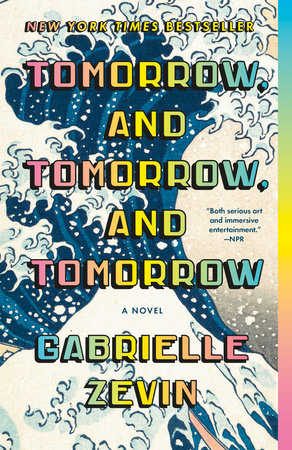
Wednesday, November 20, 2024
1pm and 4:30pm
Join us to discuss the novel:
Tomorrow, and Tomorrow, and Tomorrow
by Gabrielle Zevin
From the New York Times best-selling author of The Storied Life of A. J. Fikry—a
glorious and immersive novel about two childhood friends, once
estranged, who reunite as adults to create video games, finding an
intimacy in digital worlds that eludes them in their real lives.
Read more: gabriellezevin.com/tomorrowx3/
Resources:
- Visit the Glass Flowers at the Harvard Museum of Natural History: www.hmnh.harvard.edu/glass-flowers
- Play the vintage Donkey Kong: freekong.org
- Author's website: gabriellezevin.com
- Play Emily Blaster: gabriellezevin.com/emilyblastergame/
- Read Emily Dickinson's poetry: www.poetryfoundation.org/poets/emily-dickinson
- Watch a video play-through of the ca. 1990 Oregon Trail video game www.youtube.com/watch?v=DHdosJq66tg
- Macbeth Act 5 scene 5 (you tell me how it relates to the book as a whole): www.folger.edu/explore/shakespeares-works/macbeth/read/5/5/
- An interesting read-along with this book (though only tangentially related) is the short essay "Super Mario Kart" by John Green in his collection The Anthropocene Reviewed (2021) Full text here (courtesy of movingwriters.org)
Discussion prompts SPOILERS (some borrowed from Libromaniacs)
- This book is #76 on The New York Times "100 Best Books of the 20th Century" list. They described it thus: "The title is Shakespeare; the terrain, more or less, is video games. Neither of those bare facts telegraphs the emotional and narrative breadth of Zevin’s breakout novel, her fifth for adults. As the childhood friendship between two future game-makers blooms into a rich creative collaboration and, later, alienation, the book becomes a dazzling disquisition on art, ambition and the endurance of platonic love." Thoughts on the summary and the listing?
- Sam’s mother, the suicide victim, and Marx’s mother all have the name Anna Lee. What was Zevin saying by making that choice?
- Sam’s mom Anna says “And this is the truth of any game— it can only exist in the moment it’s being played…in the end, all we can ever know is the game that we played, in the only world that we know.” Is this philosophy one that you subscribe to? Why or why not?
- Are you a gamer? Are you familiar with the retro games or do you play MMOGs (massive multi-player online games? Did your familiarity with games (or lack thereof) matter to your enjoyment of the story?
- Sam says “The universe, he felt, was just— or if not just, fair enough. It might take your mother, but it might give you someone else in return.” And Marx says “What is a game? It’s tomorrow, and tomorrow, and tomorrow. It’s the possibility of infinite rebirth, infinite redemption. The idea that if you keep playing, you could win. No loss is permanent, because nothing is permanent, ever.” Yet, there is a quite a bit of grief and pain in the story, weren’t those losses permanent? Was there infinite redemption for the characters?
- When Sadie first came up with the idea for Both Sides, she called it a “a glimmer of a notion of a nothing of a whisper of a figment of an idea.” Have you ever had an idea like that? If so, what happened with it?
No comments:
Post a Comment